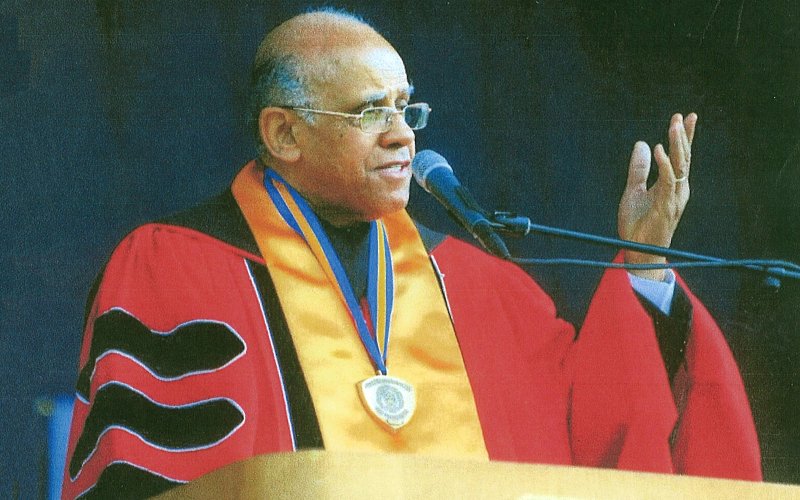Emeritus professor’s 22nd Book of Poetry Views a Harsh World with a Healing Eye

ALBANY, N.Y. (Feb. 2, 2021) — For Leonard A. Slade, Jr., writing has always been about faith, hope and charity, even as his works address real world problems.
“The aim of my poetry is to present a realistic portrayal of life and its conditions,” said Slade, emeritus professor of Africana Studies whose 27th book – 22 of poetry — was released in January by Xulon Press and titled Selected Poems for Freedom, Peace, and Love.
Among the praises for this latest work came from Sandra M. Grayson, professor of English at the University of Wisconsin at Milwaukee: “Dr. Leonard A. Slade, Jr., is a gifted poet,” she wrote. “His poems that deal with social issues reflect the complexity of people and relationships, as well as highlight some very troubling contemporary problems. Slade's poetry is truly a healing work of art.”

Slade, who joined the UAlbany faculty 31 years ago, said he also attends to poetic beauty for its own sake. “I seek to use my poetry ‘to create beauty and to elevate souls,’ as defined by Edgar Allan Poe. “I pray that my works are helping to create a better world.”
To accomplish his, he attends to his work’s major themes: “A dependence on God as a source of transcendence, conflict between cultures, a realistic portrayal of life and its vicissitudes, a search for an existential identity, and both the creation of beauty and an examination of ugliness in our complex world.” All these, he said, are to be found in Selected Poems for Freedom, Peace, and Love.
Slade came to the University following 22 years on faculty at Kentucky State University because of UAlbany's reputation as “an excellent research university. I would have the time, I thought, to write and publish and be appreciated for my efforts,” he said. The list of his works, published by such houses as McGraw-Hill Publishers, Mellen Poetry Press, SUNY Press and Xulon Press of Salem Communications, among others, have borne out the wisdom of his decision.
His books are still sold both nationally and internationally, and he has received recent invitations to read his poetry, in person, at the African American Museum in Dallas, Texas, and the Martha's Vineyard Institute of Creative Writing in Fiction and Poetry. Local invitations have come from the Albany Caribbean Association and The Cathedral of All Saints in Albany. At 77, he declines some. “I know my limitations and must take care of my health,” he said.
Those limitations do not seem to strike his desire to produce and his artistic imagination. “The experts see multifarious meanings in my latest book,” he said.
One such expert is Elizabeth Ammons, former dean of the college of arts and sciences at Tufts University: “In spare, unpretentious verse, Slade asks us to think about racism, history, love, the beauty of nature, the homeless, old teachers, you daughters, political hypocrisy, and more,” she wrote. “These are splendid, moving poems.”
“My fervent hope is that my work remains rich in symbolism and that readers will appreciate the accessibility of my poetry,” said Slade. “Very few of my poems are inaccessible.”
The oldest of nine children to husband and wife farmers who grew peanuts, cotton and corn (he remembers plowing behind a mule) and sent all nine children on to college, Slade feels an abundance of gratitude over his life and literary output. “I have a grateful heart and, yes, thank Divine Providence for telling me what to write and how to write it,” he said.




